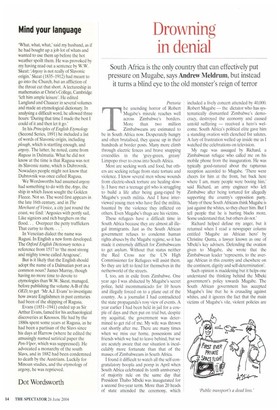Mind your language
'What, what, what,' said my husband, as if he had bought up a job lot of whats and wanted to use them up before the hot weather spoilt them. He was provoked by my having read out a sentence by W.W. Skeat: Argosy is not really of Slavonic origin.' Skeat (1835-1912) had meant to go into the Church, but an affliction of the throat cut that short. A lectureship in mathematics at Christ's College, Cambridge 'left him ample leisure'. He edited Langland and Chaucer in several volumes and made an etymological dictionary. In analysing a difficult word, he allowed three hours: 'During that time I made the best I could of it and then let it go.'
In his Principles of English Etymology (Second Series, 1891) he included a list of words of Slavonic origin, including plough, which is startling enough, and argosy. The latter, he noted, came from Ragusa in Dalmatia. What he did not know at the time is that Ragusa was not its Slavonic name, which is Dubrovnik. Nowadays people might not know that Dubrovnik was once called Ragusa.
We Wordsworths had assumed argosy had something to do with the Argo, the ship in which Jason sought the Golden Fleece. Not so. The word first appears in the late 16th century, and in The Merchant of Venice, a city just round the coast, we find: 'Argosies with portly sail, Like signiors and rich burghers on the flood. . . Overpeer the petty traffickers That curtsy to them. . .
In Venetian dialect the name was Ragusi. In English a new form developed. The Oxford English Dictionary notes a reference from 1517 to 'the most strong and mighty towne called Aragouse'.
But is it likely that the English should adopt the name of a Dalmatian port as a common noun? James Murray, though having no more time to devote to etymologies than W.W. Skeat, managed, before publishing the volume A-B of the OED, to get 'Mr A.J. Evans' to investigate how aware Englishmen in past centuries had been of the shipping of Ragusa.
Evans (1851-1941) ended up as Sir Arthur Evans, famed for his archaeological discoveries at Knossos. He had by the 1880s spent some years at Ragusa, as he had been a partisan of the Slays since his days at Harrow (where he edited the amusingly named satirical paper the Pen-Viper, which was suppressed). He advocated a monarchy of the south Slays, and in 1882 had been condemned to death by the Austrians. Luckily for Minoan studies, and the etymology of argosy, he was reprieved.
Dot Wordsworth


































































 Previous page
Previous page